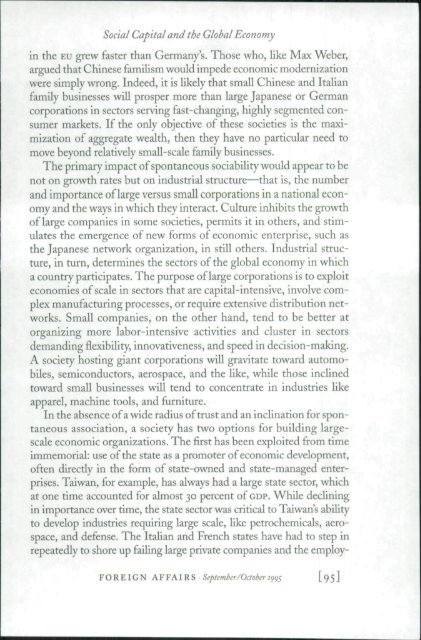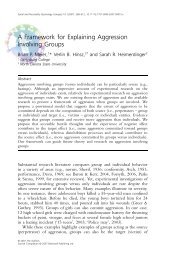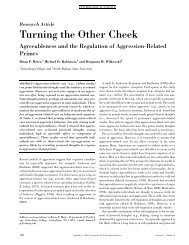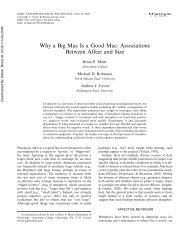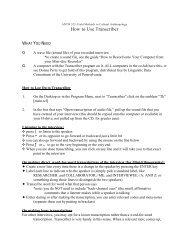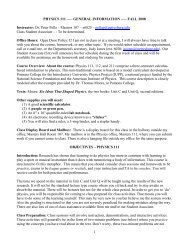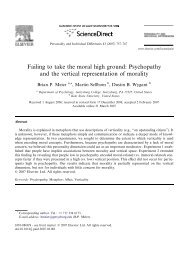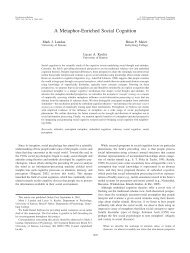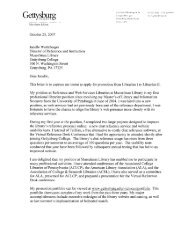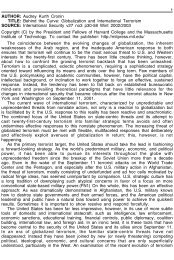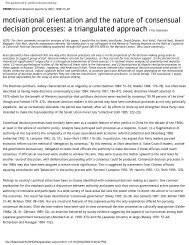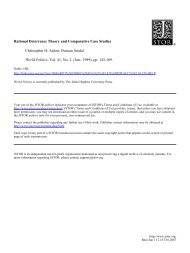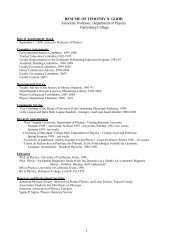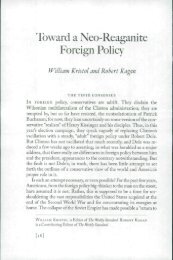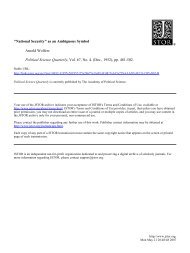Francis Fukuyama. 1995 "Social Capital and the Global Economy."
Francis Fukuyama. 1995 "Social Capital and the Global Economy."
Francis Fukuyama. 1995 "Social Capital and the Global Economy."
You also want an ePaper? Increase the reach of your titles
YUMPU automatically turns print PDFs into web optimized ePapers that Google loves.
<strong>Social</strong> Capita! <strong>and</strong> tbe <strong>Global</strong> <strong>Economy</strong><br />
in <strong>the</strong> EU grew faster than Germany's. Those who, like Max Weber,<br />
argued that Chinese familism would impede economic modernization<br />
were simply wrong. Indeed, it is likely that small Chinese <strong>and</strong> Italian<br />
family businesses will prosper more than large Japanese or German<br />
corporations in sectors serving fast-changing, highly segmented consumer<br />
markets. If <strong>the</strong> only objective of <strong>the</strong>se societies is <strong>the</strong> maximization<br />
of aggregate wealth, <strong>the</strong>n <strong>the</strong>y have no particular need to<br />
move beyond relatively small-scale family businesses.<br />
The primary impact of spontaneous sociability would appear to be<br />
not on growth rates but on industrial structure—that is, <strong>the</strong> number<br />
<strong>and</strong> importance of large versus small corporations in a national economy<br />
<strong>and</strong> <strong>the</strong> ways in which <strong>the</strong>y interact. Culture inhibits <strong>the</strong> growth<br />
of large companies in some societies, permits it in o<strong>the</strong>rs, <strong>and</strong> stimulates<br />
<strong>the</strong> emergence of new forms of economic enterprise, such as<br />
<strong>the</strong> Japanese network organization, in still o<strong>the</strong>rs. Industrial structure,<br />
in turn, determines <strong>the</strong> sectors of<strong>the</strong> global economy in which<br />
a country participates. The purpose of large corporations is to exploit<br />
economies of scale in sectors that are capital-intensive, involve complex<br />
manufacturing processes, or require extensive distribution networks.<br />
Small companies, on <strong>the</strong> o<strong>the</strong>r h<strong>and</strong>, tend to be better at<br />
organizing more labor-intensive activities <strong>and</strong> cluster in sectors<br />
dem<strong>and</strong>ing flexibility, innovativeness, <strong>and</strong> speed in decision-making.<br />
A society hosting giant corporations will gravitate toward automobiles,<br />
semiconductors, aerospace, <strong>and</strong> <strong>the</strong> like, while those inclined<br />
toward small businesses will tend to concentrate in industries like<br />
apparel, machine tools, <strong>and</strong> furniture.<br />
In <strong>the</strong> absence of a wide radius of trust <strong>and</strong> an inclination for spontaneous<br />
association, a society has two options for building largescale<br />
economic organizations. The flrst has been exploited from time<br />
immemorial: use of<strong>the</strong> state as a promoter of economic development,<br />
often directly in <strong>the</strong> form of state-owned <strong>and</strong> state-managed enterprises.<br />
Taiwan, for example, has always had a large state sector, which<br />
at one time accounted for almost 30 percent of GDP. While declining<br />
in importance over time, <strong>the</strong> state sector was critical to Taiwan's ability<br />
to develop industries requiring large scale, like petrochemicals, aerospace,<br />
<strong>and</strong> defense. The Italian <strong>and</strong> French states have had to step in<br />
repeatedly to shore up failing large private companies <strong>and</strong> <strong>the</strong> employ-<br />
FOREIGN AFFAIRS- September/October <strong>1995</strong> [95]


